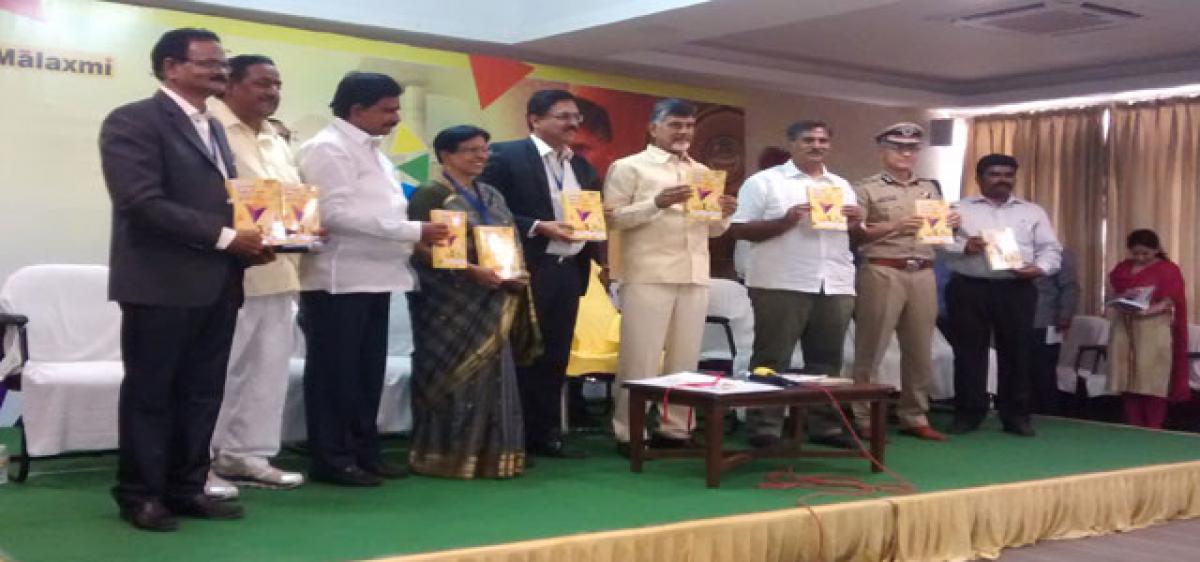Live
- Six Useful Strategies to Control Your Heart During the Pollution Season
- Phalodi Satta Bazar Predicts Close Race in Maharashtra Assembly Election 2024
- Federer Pays Heartfelt Tribute to Nadal Ahead of His Retirement: "An Epic Career"
- Odisha holds successful mega investors roadshow in Singapore
- PGTI Tour: Top stars to fight for honours in Servo Masters Golf
- SC upholds termination of LIC employee for absenting himself without intimation
- ‘Stone me or shoot me, won’t spare anyone,’ says Anil Deshmukh after discharge
- Siddaramaiah, Shivakumar turning Karnataka into Pakistan: K’taka BJP
- Zimbabwe records 70 suspected cholera cases, one death amid new outbreak
- Babri demolition day: No Assembly proceedings in Bengal on Dec 6
Just In
Amaravati Poetic Prism 2016 brings poets across country together


A multilingual stream of poesy vied with the Krishna River, and the resultant poetic bonhomie soared over the Indrakiladri for two days on November 13 and 14.
A multilingual stream of poesy vied with the Krishna River, and the resultant poetic bonhomie soared over the Indrakiladri for two days on November 13 and 14. The ‘Amaravati Poetic Prism 2016: International Multilingual Poets Meet’ was a gala poetic event at the Haritha Berm Park of the APTDC on the banks of the sacred Krishna.
As many as 80 poets from across the country, including one from Thailand, read out 99 poems in as many as 27 Indian and foreign languages – Telugu, Assamese, Bengali, Bhojpuri, Dogri, Gujarati, Hindi, Kannada, Kodava Takk, Koya, Maithili, Malayalam, Marathi, Mizo, Odiya, Punjabi, Sanskrit, Sindhi, Tamil, Urdu; English, Esperanto, French, German, Mandarin, Thai, and Vietnamese. The nearby Prakasam barrage appeared to be a bridge connecting the orient and the occident.
Chief Minister Chandrababu Naidu, the chief guest, launched the concomitant anthology running into 528 pages, with 527 poems in 53 languages from across the globe, including even little known tongues and dialects. Many Sahitya Akademi awardees had contributed to the anthology.
Chandrababu made a scintillating speech tracing the overseas trade and cultural intercourse of Andhras to the Satavahana era when Amaravati was their capital, which again his government was determined to develop as a world class city, with a visionary spirit.
The river valleys brought in the first civilizations; and arts and letters flourished in them. It was how great poets like Jnan Pith awardee Viswanatha Satyanarayana, Veturi Prabhakara Sastry, Veturi Sundararama Murty, Tummala Seetharama Murthy and Vemulapalli Srikrishnawere born here and became household names. The graceful Kuchipudi dance also originated in these parts.
This poetic event was very much in line with that eclectic spirit of the Andhras, he said, and in a lighter vein exhorted the poets to sit on the banks of the Krishna to derive their poetic afflatus. In tune with the spirit of the multilingual meet the CM spoke in both Telugu and English.
The CM felicitated a cross-section of prominent poets. Other dignitaries who shared the dais were Devineni Umamaheswara Rao (Minster for Irrigation), ‘Nani’ Kesineni Srinivas (MP), and Gautam Sawang (Commissioner of Police).
Inauguratingthe first day’s programme, Gadde Anuradha (ZP Chairperson) observed that this international multilingual poetry fest reflected the Indian ethos of unity in diversity. The government of the new AP was doing its best to develop Amaravati as a vibrant centre of art and culture as well.
Mayor Koneru Sridhar recommended poetry instead of the present day films that had nothing worthwhile in them.VMC Commissioner G Veerapandianwho spoke in English, Telugu and Tamil, promised to extend the necessary support to literary and cultural activities. G Haribabu, Corporator (Ward 26) also spoke.
It was a heartening spectacle to watch and listen to a mix of budding and accomplished poets in a kaleidoscope of tongues, the youngest and the oldest being 18 and 85 respectively, and a good enough chunk of them were bilingual.
The poets included Madhurantakam Narendra, Katuru Ravindra Trivikram, Kondreddy Venkateswara Reddy, T Vasudeva Reddy,Raama Chandra Mouli, Babbellapati Indira, Ramateertha, Jagaddhatri, Mantri Krishna Mohan (Sahitya Akademi Yuva awardee) and U Atreya Sarma.
Organised by The Cultural Centre of Vijayawada and Amaravati (CCVA), the cultural wing of Malaxmi Group, the event was co-sponsored by AP Tourism, Granules, and Dept of Language and Culture of Govt. of AP. The proceedings were conducted by the CCVA functionaries Y Harish Chandra Prasad (Founder and Chief Mentor); Dr E Sivanagi Reddy, CEO; and Padmaja Iyengar (Hon. Lit. Advisor).
By way of finale, the poetic souls were transported to aesthetic summits by the Kuchipudi ballets on Mahishasura Mardini and the upcoming capital Amaravati, enacted by Sowmya and team, under the direction of Bhagavatula Rama Sarma.
The poetic concourse was conspicuous for its edifying conviviality between the Andhra and Telangana poets within the larger national spectrum. However, a wistful note lingers why such a wonderful event was kept an in-camera affair. Had it been thrown open for public view it could have created a much greater impact, for after all, poets and writers need audience and readers.

© 2024 Hyderabad Media House Limited/The Hans India. All rights reserved. Powered by hocalwire.com






